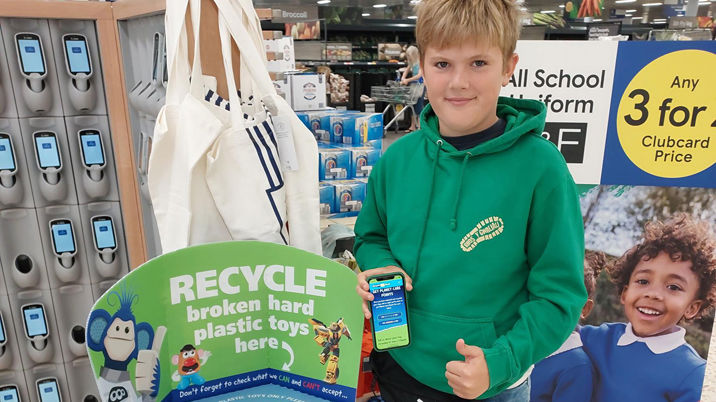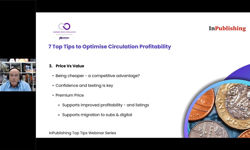
Q: What progress has been made by the publishing industry in the last few years to improve the sustainability of the sector?
A: It’s great to recognise that a number of market-leading publishers, including our share-holders Bauer Media and Immediate have become signatories of the PPA net-zero pathway with the aim to decarbonise the publishing industry and achieve net-zero emissions across the sector by 2050.
The signatories have committed to reducing emissions from their own operations, influence their suppliers and distributors, as well as promoting positive behavioural change with their audiences.
Publishers have been taking greater responsibility with their procurement and, in particular, ensuring that they are using sustainably sourced paper, which can include certifications from the Forest Stewardship Council (FSC) or the Programme for the Endorsement of Forest Certification (PEFC).
This, however, will be taken to a new level of responsibility, where publishers will be required to pin-point the geo-location their paper was harvested as part of legislation coming from the European Green Deal and EU Deforestation Regulation (EUDR). Publishers have also been reducing treatments to front covers including foil blocks and laminates that can impede the recycling of paper and reducing packaging and exploring alternative methods to plastic wrap.
Importantly, more publishers are bringing sustainability higher and higher up their agendas. We have seen publishers implementing environmental management systems and Thierry Panhelleux at Hearst has been an inspiration and encouraged us to implement ISO14001 and we have achieved the standard as we continue our journey of constant improvement. Other inspirations include Peter Johnson and Heidi Florence at Creature & Co, the publisher of National Geographic Kids who are now B-Corp certified and Michelle Whitehead at Immediate who has been doing extensive amounts of measurement, target setting and engaging with their business in a phenomenal way to help empower their people to make a difference.
Q: What trends are driving progress in this area?
A: Paper manufacturers have gone a long way to invest in renewable energies, improve resource efficiencies, reduce waste and have now started to implement new programmes to improve biodiversity. They have been investing in several sources of renewable energies, including wind, solar, hydro-electric and bio-mass energy using waste products from harvesting trees.
From a technical perspective, as part of The Frontline Group, we have invested in our people and supply chain systems which have gone a long way to help publishers lower print runs and therefore, have reduced the amount of resources we have been using. We have achieved this through store specific ranging at key retailers, and through collaboration with our supply chain partners, we have invested in the copy and gift re-use infrastructure and developed a new rapid replenishment system, which sees more copy held upstream allowing for ‘just in time’ deliveries being allocated to stores based on daily EPoS feeds from retail.
Q: What is the goal when it comes to sustainability?
A:
1. Engage with your people. Sustainability is no longer the responsibility of those in ESG roles or people with a passion. We are all responsible for saving the planet, to make a positive contribution to society and ensure our children have a safe place to live. I must admit, however, I really don’t like the use of the phrase, “saving the planet”. The planet will survive humans, it’s just we are going to make it a very difficult place to live for future generations if don’t take action now.
At Seymour and Frontline we have created a team of ‘Change Makers’ who have been empowered to make a difference, including their involvement in business projects, improving resource efficiencies, responsible procurement and delivering brilliant activations across our group to help everybody join the sustainability journey wherever they may be on that path. It’s not about being perfect overnight, it’s about starting on our road of improvement.
2. Reduce out impact on the environment. To align our industry with the Paris Agreement, CO2 emissions must decline by 45% from 2010 levels by 2030 and reach net-zero by 2050. The key priority for the magazine market, therefore, is to reduce greenhouse gas emissions from the production of paper, printing of magazines and our supply chains. Biodiversity is also incredibly important, not only for protecting natural habitats and species across the planet, but also understanding it’s simply the other side of the climate change coin — the two things are inextricably linked.
3. Influence our audiences and drive positive behavioural change. The magazine industry, like no other, has an incredible opportunity to influence their audiences.
Magazines can be a force for good, helping educate our readerships through the products they trust, editors they respect or the characters they love. As an industry, we have the potential to have an influence on society that drives positive behaviour for the environment that exceeds the impact we have.
4. Improve our contribution to society. By aligning their corporate values with sustainability goals, publishers can make a more significant impact on society and the communities we operate in. At Seymour, we are passionate about children’s literacy, and we are motivated to do our part to address the inequality that magazines and books aren’t available to all. The National Literacy Trust estimate that a million British children don’t have a book of their own and 1 in 8 primary schools don’t have a library. We feel that our industry has a great opportunity to help address such challenges, by being involved in and motivating others to support community projects to make a positive difference.
5. Helping publishers navigate forthcoming legislation. There is an enormous amount of legislation coming over the horizon with the European Green Deal and whilst it’s unclear how the UK government will follow, many of our publishers export their magazines to Ireland and Europe.
This includes EU Deforestation Regulation (EUDR) and Corporate Sustainability Reporting Directive (CSRD) and we are helping publishers help navigate their way through this legislation and understand how we will report back to our partners in the value chain.
Q: What’s in the pipeline from Seymour?
A: By working collaboratively with children’s magazine publishers across Seymour and Frontline, we have learnt to understand the important role our category plays in children’s development and literacy.
We have, therefore, been on a journey to understand how we can enhance and magnify these benefits.
Magazines provide children with the opportunity to engage with literacy, to be creative and to learn about the world around them. They also provide an engaging alternative to screen time, at a time when our lives have become inevitably more digital.
An integral element of the magazine experience is the covermounted toys, which complement the content and provide stimulus for fun, play, creativity and learning. Recent expert research involving over a thousand parents of 3 to 10-year-olds confirmed that they help to engage reluctant learners with educational content; the toys are beneficial for children with additional needs and families on low incomes particularly perceive that magazines and the toys are beneficial for their children. The research demonstrates that children’s magazines with covermounted toys have the power to transform the educational landscape for children in lower income families and reluctant readers.
We continue to support the National Literacy Trust and have now donated over 100,000 magazines to their local heroes at their local hubs who get our amazing products to those most in need. We want to understand how we can work with retailers, and supply chain partners to do more and engage our shoppers and readers to join that journey with us, as we look to promote the benefits of reading magazines together with our children as we look to address the literacy crisis in the UK.
We also continue our efforts with the not-for-profit organisation Wastebusters and Products of Change to drive forwards the Recycle to Read initiative, where customers can recycle unwanted and broken toys and in 2025, we are looking to take the successful trials at retail and begin rolling this out to a national level.
Recycle to Read brings together cross-sector stakeholders to develop a new environmental and sustainable infrastructure for recycling toys, whilst rehoming unwanted toys, to unlock considerable social, economic, and environmental benefits. The programme combines environmental education with consumer action, to empower young people to choose a more sustainable future. In return for rehoming unwanted toys and recycling broken toys and other recyclable items, schools and communities are rewarded with books and reading resources. Children’s magazine publishers were the founding partner of this initiative, and we are now garnering the support and influence of key players in the toy and licensing industry.
This video captures the scheme brilliantly:

About us
Seymour supplies over 60 million copies of magazines into retailers across the UK and Ireland each year; representing over 100 independent publishers and more than 1,400 magazines and bookazines.
Internationally we export magazines to over 70 territories and import international magazines into the UK from the US and Europe.
We work with independent publishers to understand their objectives and design and implement circulation strategies to get them to market. Our effective relationships across retail multiples, wholesale and overseas networks, coupled with dynamic supply management systems and consumer insight, elevate our publishers amongst the rest.
We understand we sit in a pivotal area between publishers, retailers and supply chain providers and, therefore, want to utilise our influential position in the value chain to promote and amplify positive change.
Email: duncan.shearer@seymour.co.uk
Website: frontline-group.co.uk/seymour










